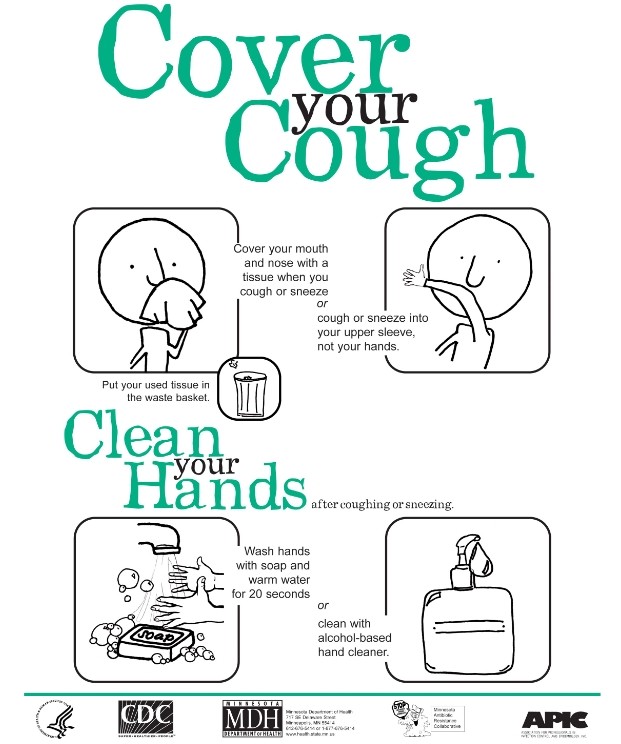Latest News
Dr. Theodore Capron Joins Speare Memorial Hospital Board of Directors
Breastfeeding Support Group Announces New Location and Time Beginning January 2026
 Now that the summer season is over we are entering the fun season of sweaters, fall foliage, and pumpkin spice everything. Unfortunately, this change also tends to bring on the start of the dreaded Influenza (flu) season. Last flu season (2017-2018) was one of the most severe seasons we have had in the past several years, across all age groups. This leaves many of us worried about what the upcoming flu season will bring. Though we cannot predict how this season will go, we can educate ourselves on what influenza is, how it spreads, and, most importantly, what we can do to prevent getting sick. Here is some basic information about flu to get you started.
Now that the summer season is over we are entering the fun season of sweaters, fall foliage, and pumpkin spice everything. Unfortunately, this change also tends to bring on the start of the dreaded Influenza (flu) season. Last flu season (2017-2018) was one of the most severe seasons we have had in the past several years, across all age groups. This leaves many of us worried about what the upcoming flu season will bring. Though we cannot predict how this season will go, we can educate ourselves on what influenza is, how it spreads, and, most importantly, what we can do to prevent getting sick. Here is some basic information about flu to get you started.
What is it?
Flu is a contagious respiratory illness caused by influenza viruses. It causes mild to severe illness and can lead to death. Common symptoms include fever, cough, sore throat, runny/stuffy nose, body aches, headache, chills, fatigue, and sometimes diarrhea and vomiting.
Who gets it?
Anyone of any age, even the healthiest of us, can get the flu. There are, however, some people who are at higher risk of developing serious complications related to the flu such as people over the age of 65, have chronic medical conditions (i.e. asthma, diabetes, or heart disease), have weakened immune systems, pregnant women, and children under the age of 5. Some common influenza-related complications include bacterial pneumonia, ear infections, sinus infections, and worsening of chronic medical conditions.
 How does it spread?
How does it spread?
The most common way that influenza is spread is via tiny droplets released when people who have the flu cough, sneeze or talk. Some of these droplets are breathed in by those people nearby. Other droplets land on surfaces or objects nearby and are spread when someone touches that surface and then touches their own mouth, nose, or eyes. You may be able to pass on the flu to someone else before you even know you are sick. Some people with influenza may be able to infect others beginning as early as one day before they develop symptoms. Generally, people are most
contagious in the first 3-4 days after their symptoms develop, but they may remain contagious for up to a week (or even longer in young children and people with weakened immune systems).
How is it diagnosed?
It is sometimes difficult to tell the difference between influenza and a number of other illnesses based on symptoms alone. To help aid in the diagnosis, some providers will do a “flu swab” to try to confirm influenza. Others choose not to test for influenza and make their treatment decisions based on symptoms and clinical judgment.
How is it treated?
Most people who get the flu have mild illness and do not require medical care. For those in a high-risk group or who are very sick, may need antiviral medication. Antiviral medications fight against viruses (similar how antibiotics fight against bacteria). They are most effective when started within a couple days of getting sick, however, they can still be helpful if they are started later in the illness.
How do we prevent it?
One of the most important steps you can take is to get your annual influenza vaccine. The CDC recommends everyone 6 months of age and older who are able to should get a flu vaccine every year before flu activity begins in their community (ideally by the end of October). Though this cannot provide you with 100% protection from the flu, it can lower your chances of getting sick, reduce the severity of illness if you do get the flu, decrease the risk of having a flu-related hospitalization, and protect those around you who are more vulnerable to serious flu illness that are unable to get the vaccine. If you haven’t already gotten your flu vaccine yet this season, you should consider attending one of the flu clinics being put on by Speare’s Occupational Health team. (see below for dates, times and locations)
Other important ways you can prevent spreading influenza include:
Washing your hands. This is especially important after you cough or sneeze into a tissue, before you eat, and after time spent around someone who is sick. Clean and disinfect surfaces that may be contaminated with germs.
Wear a mask if you are within 6 feet of someone who is coughing/sneezing or if you are not sick enough to be out of work, but feel like you might be coming down with something (remember, you can spread flu before you even know you are sick).
Stay home if you are sick (you should not return to work until at least 24 hours after your fever is gone and without taking fever-reducing medicine). This not only helps to prevent your germs from spreading to others but staying home and getting rest can also help you get well sooner than if you stressed your body by trying to work while you are sick.
By doing these simple actions we can greatly reduce the risk of spreading influenza to family, friends, co-workers and even ourselves.
Want to learn more? For more information about influenza and the flu vaccine contact the Speare’s Infection Prevention Coordinator (Erica Tuttle) or check out the CDC’s Influenza page.
Dates, Locations & Times
Vaccines are administered by a Registered Nurse and most insurances are accepted, including Medicare and Medicaid.
You will be asked to present your insurance card prior to receiving the vaccine.
For those without insurance, $35.00 for Quadrivalent & $65.00 for Fluzone High Dose
October 10, 2018 (Wednesday): at Waterville Town Offices 130pm–3pm
October 24, 2018 (Wednesday): at Holderness Town Hall 11am-1pm
October 26, 2018 (Friday): at Speare: Main Lobby 8am – 5pm
October 31, 2018 (Wednesday): at Plymouth Senior Center 11am-1pm
November 5, 2018 (Monday): at Speare: Main Lobby 8am – 4pm
November 30, 2018 (Friday): at Speare: Main Lobby 12pm – 6pm
INFORMATION & DIRECTIONS
Speare Memorial Hospital Main Lobby
Waterville Valley Town Hall
Holderness Town Hall
Plymouth Senior Center
For more information please call
Speare’s Occupational and Employee Health Department at (603) 238-2348.

